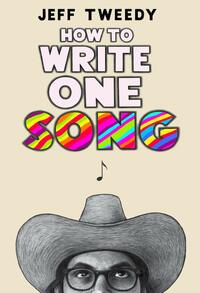Take a photo of a barcode or cover
I'm an increasingly doughy white man who's lived in Chicago for over a decade and yet I remain mostly Wilco-ambivalent. Yankee Hotel Foxtrot blew open my little eighth-grade head when I heard it in 2002, and it still sounds like nothing else Wilco, or any other band, did before or after - a true achievement. I'll also always be very fond of Being There, their not-actually-that-sprawling post-grunge Big Pink update, which I bought when I was 14 because it was the only other Wilco CD in stock at my local Hastings (R.I.P.). Beyond that, I haven't really connected with any of their albums. This is all to say that I read this book not as a Tweedy devotee but because I thought it might help me get back in the mindset of actively creating again after a year of pandemic and new parenthood - what this book calls "a generalized atmosphere of making things." What I got from it was a serene and reassuring read, with the indelible takeaway that you must "invite inspiration in" and a strong dose of Richard Linklater vibes (not a bad thing). In my head, I heard Ethan Hawke in full Before _____ mode reading this book aloud. It's got the same open-eyed, open-hearted, dude-born-in-the-'60s who's all like "wow man, just think about like, all these different consciousnesses out there trying to connect with one another, isn't that something holy?" type of tone. It can sound ponderous or corny, sure, but that doesn't mean it isn't genuine, and isn't that what matters? It's like at the end of Boyhood, when the kid stares off at a desert sunset and says, "It's always. . . right now." Both times I saw that movie, people in the audience laughed at that, which is fair, because you're watching a stoned 18-yr-old having Deep Thoughts - but also, y'know, he's not exactly, like, wrong. Anyway, this book sorta felt like that.
I wanted to get a look inside someone else's song writing process and this book really did that for me. Jeff presented some good ideas about inspiration specifically on lyrics, but also on jotting down ideas and recording audio in the moment. I've had lots of ideas that I haven't recorded (for better or worse, who knows?) but I couldn't later recall. this is a fast read and recommended.
A terrific guide to songwriting which will benefit beginners. Sage advice on lyric, melody and composition, with memoir thrown in.
As an aspiring songwriter who’s been playing music for many years, this book does many things well. It prioritizes putting things in layman’s terms and doesn’t get involved in music theory or academic approaches to writing music. It focuses more on the feeling of creation, and how to put yourself in a space where that can happen more organically (how to disappear into the process). Some of the exercises did not resonate with me but many did, and Jeff’s humor and down-to-earth-ness throughout was very refreshing. At the end of the day, he encourages you to write a song that makes you feel good, not one that can objectively be described as “good.”
informative
informative
slow-paced
Loved this. Already thinking about when I can read and listen again. Tweedy is always right on.
A short, charming read. I am not a songwriter, nor do I aspire to be one, but my husband got this for me since I'm a big Tweedy fan. I will use some of the writing exercises in there if only to get back into some creative writing I used to do (I don't play an instrument and surprisingly haven't learned despite, you know, the pandemic). But, primarily I enjoyed reading this as a way to see how Jeff Tweedy approaches songwriting. I found the writing exercises interesting, and knowing how some Wilco/Tweedy lyrics came to be was kind of surprising. I will say that, as a big fan, you want to believe every lyric he's written has some deep meaning or personal connection or lived history or something (because he's a great lyricist!) and it's kind of weird to know that, maybe, that one song actually started a noun-verb agreement-turned poem exercise. But, hey, it works.
funny
inspiring
reflective
medium-paced



